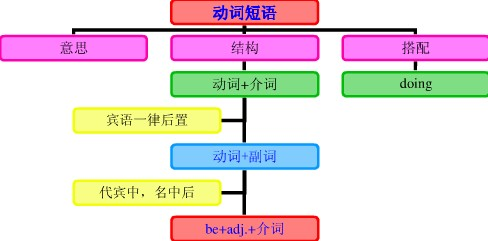本试题 “The novel written by the author________ well,but five years ago no one could have imagined how great arole he ________in the literary world.[ ]A....” 主要考查您对动词短语
一般现在时
等考点的理解。关于这些考点您可以点击下面的选项卡查看详细档案。
- 动词短语
- 一般现在时
动词短语的概念:
动词常和某些其他词类用在一起,构成固定词组,形成所谓短语动词(phrasalverb)。和动词一样,短语动词也可分为及物和不及物两种。短语动词可以作为一个整体看待,同一般动词一样使用。
动词短语的搭配类型:
1)动词+介词:这类短语动词用作及物动词,后面须跟宾语。
如:The small boy insisted on going with his parents. 那男孩坚持要跟父母一起去。
Do you often listen to broadcasts in English? 你常听英语广播吗?
Look at the children. Aren't they lovely? 看着这些孩子们。他们多么可爱呀!
We stand for self-reliance. 我们是主张自力更生的。
这一类的短语动词还有很多,如depend on(upon)(依靠),wait on(服侍),look for(寻找),deal with(对待),look after(照料),wait for(等待)等。
2)动词+副词:
这类短语动词有的用作及物动词,有的用作不及物动词。
如:I always get up as soon as the bell rings. 我总是一打铃就起床。(不及物)
Look out, there's a car coming! 当心,来汽车了!(不及物)
Have you handed in your exercises already? 你已经交练习了吗?(及物)
Please don't forget to put on your coat, it's cold outside. 请不要忘记穿外衣,外面很冷。(及物)
这一类的短语动词还有很多,及物如put out(扑灭),eat up(吃光),put down(放下);不及物如set off(出发),come up(走近),go on(继续)。
注:"动词+副词"这类短语动词和上面第一类"动词+介词"的不同之处在于:"动词+介词"用作及物动词,后面须跟宾语。"动词+副词"则有的及物,有的不及物;用作及物动词而宾语为人称代词或自身代词时,副词往往放在宾语之后。
如:Please wake me up at five tomorrow. 请在明天早上五点唤醒我。
If you have done your exercises, please hand them in. 如果你们练习做完了请交来。
She doesn't normally behave like that, she's putting it on. 她通常并不如此表现,她是装出来的。
注:这类短语动词有不少可兼作及物和不及物动词用。
如:He took off his hat when he entered the office. 他进办公室后脱下帽子。(及物)
The plane took off at seven sharp. 飞机在七点整起飞。(不及物)
Charlie rang up Neil to ask about the time of the meeting. 查理打电话给尼尔问开会的时间。(及物)
If you can't come, please ring up and let us know. 你如来不了,请来电话告诉我们一声。(不及物)
3)动词+副词+介词:
"动词+副词"之后有的可以再加一个介词,形成另一种短语动词。这类短语动词用作及物动词。
如:Do not give up hope. We must go on with the experiment 不要失望。我们必须继续试验。(go on with继续)
He came up to me. 他走到我跟前。(come up to走近)
这类短语动词还有:look down upon(看不起),do away with(去掉),put up with(忍受)等。
4)动词+名词+介词:
这类短语动词也是及物的。
如:He shook hands with all the guests at the banquet. 他在宴会上和宾客一一握手。
Young pioneers often come to the Children's Palace to take part in after school activities.少先队员经常到少年宫来参加课外活动。
Pay attention to the temperature of the stored rice. 注意仓库里的稻谷的温度。
Her job is taking care of the babies. 她的工作是照顾婴儿。
这一类短语动词还有:put an end to(结束),take notice of(注意),catch hold of(抓住),lose sight of(看不见),make use of(利用)等。
动词短语知识体系:

一般现在时的概念:
表示通常性、规律性、习惯性的状态或者动作(有时间规律发生的事件)的一种时间状态。
一般现在时的用法:
1)经常性或习惯性的动作,常与表示频度的时间状语连用。常用的时间状语有every...,sometimes,at...,on Sunday等。
例如:I leave home for school at 7 every morning. 每天早上我七点离开家。
2)客观真理,客观存在,科学事实。
例如:The earth moves around the sun. 地球绕太阳转动。
Shang hai lies in the east of China. 上海位于中国东部。
3)表示格言或警句。
例如:Pride goes before a fall. 骄者必败。
注意:此用法如果出现在宾语从句中,即使主句是过去时,从句谓语也要用一般现在时。
例如:Columbus proved that the earth is round. 哥伦布证实了地球是圆的。
4)现在时刻的状态、能力、性格、个性。
例如:I don't want so much. 我不要那么多。
Ann writes good English but does not speak well. 安英语写得不错,讲的可不行。
比较:Now I put the sugar in the cup. 把糖放入杯子。
I am doing my homework now. 我正在做功课。
第一句用一般现在时,用于操作演示或指导说明的示范性动作,表示言行的瞬间动作。
第二句中的now是进行时的标志,表示正在进行的动作的客观状况,所以后句用一般现在时。
一般现在时知识体系:

一般现在时用法拓展:
1、一般现在时表将来:
1)下列动词come, go, arrive, leave, start, begin, return的一般现在时可以表示将来,主要用来表示在时间上已确定或安排好的事情。
例如:The train leaves at six tomorrow morning. 火车明天上午六点开。
—When does the bus star? 汽车什么时候开
—It stars in ten minutes. ?十分钟后。
2)以here, there 等开始的倒装句,表示动作正在进行。
例如:Here comes the bus.=The bus is coming. 车来了。
There goes the bell.=The bell is ringing. 铃响了。
3)在时间或条件句中。
例如:When Bill comes(不是will come), ask him to wait for me. 比尔来后,让他等我。
I'll write to you as soon as I arrive there. 我到了那里,就写信给你。
4)在动词hope, take care that, make sure that 等的宾语从句中。
例如:I hope they have a nice time next week. 我希望他们下星期玩得开心。
Make sure that the windows are closed before you leave the room. 离开房间前,务必把窗户关了。
2、一般现在时代替一般将来时:
When, while, before, fter, till, once, as soon as, so long as, by the time, if, in case(that), unless, even if, whether, the moment, the minute, the day, the year, immediately等引导的时间状语从句,条件句中,用一般现在时代替将来时。
例如:He is going to visit her aunt the day he arrives in Beijing. 他一到北京,就去看他姨妈。
3、一般现在时代替一般过去时:
1)"书上说","报纸上说"等。
例如:The news paper says that it's going to be cold tomorrow. 报纸上说明天会很冷的。
2)叙述往事,使其生动。
例如:Napoleon's army now advances and the great battle begins. 拿破仑的军队正在向前挺进,大战开始了
4、一般现在时代替现在完成时:
1)有些动词用一般现在时代替完成时,如hear, tell, learn, write, understand, forget, know, find, say, remember等。
例如:I hear(=haveheard)he will go to London. 我听说了他将去伦敦。
I forget(=have forgotten)how old he is. 我忘了他多大了。
2)用句型"It is…since…"代替"It has been…since…"。
例如:It is(=has been)five years since we last met. 从我们上次见面以来,五年过去了。
5、一般现在时代替现在进行时:
在Here comes…/There goes…等句型里,用一般现在时代替现在进行时。
例如:There goes the bell.铃响了。
时态一致:
1、如果从句所叙述的为真理或相对不变的事实,则用现在时。
例如:At that time, people did not know that the earth moves. 那时,人们不知道地球是动的。
He told me last week that he is eighteen.上星期他告诉我他十八岁了。
2、宾语从句中的,助动词ought, need, must, dare的时态是不变的。
例如:He thought that I need not tell you the truth. 他认为我不必告诉你真相。
与“The novel written by the author________ well,but five ye...”考查相似的试题有:
- — Have you finished your homework yet?— Not yet. I ______ to do it just a few minutes ago.[ ]A. got downB. set aboutC...
- With the aid of the scientists, more new facts about the sea will _______ gradually.A.bright to lightB.come to ligh...
- The most important word in the sentence has been_____ , so it doesn’t make any sense.A.made outB.picked upC.left o...
- You cannot be more careful when crossing the street, or you may ___ by cars. A.be run awayB.get run outC.get run o...
- Whenever it is, it is right for a student to ______ the school disciplines.A.seeB.watchC.noticeD.observe
- We have got accustomed__________ in an air—conditioned room, so we can’t stand the terrible heat outside.A.to liveB...
- You are not to smoke in the hospital.A.knownB.supposedC.regardedD.considered
- I believe a leaf of grass is than a star in the sky.Every plant gives us pleasure in its own way.A.not less thanB...
- The lift _____ and we were trapped inside it.A.broke downB.broke upC.broke out D.broke in
- She _____ her mother in appearance but they are different from each other in character.A.resemblesB.looksC.is simi...